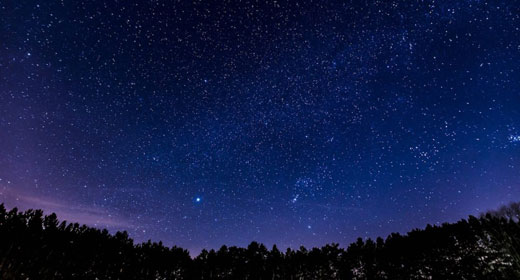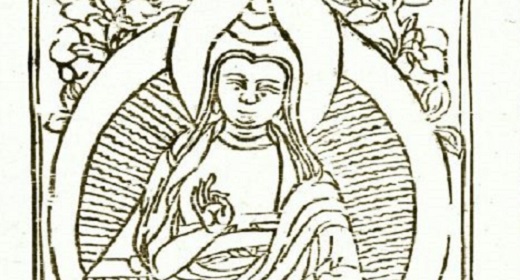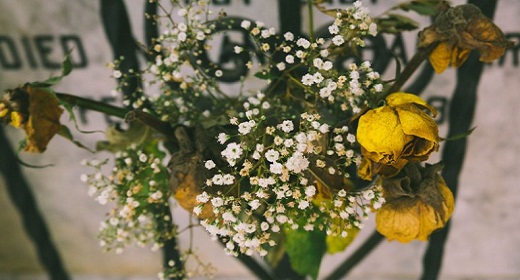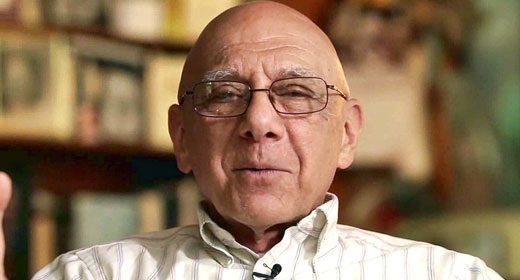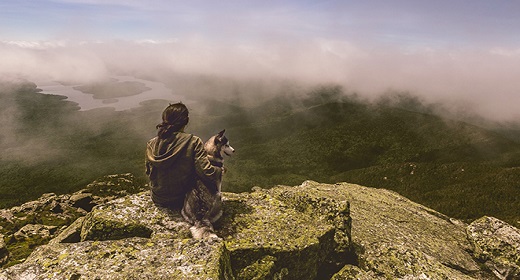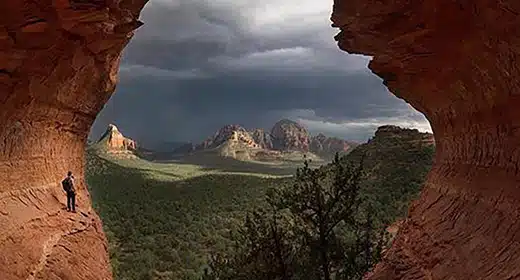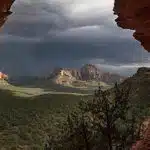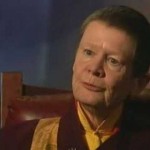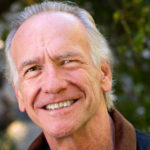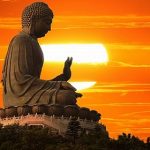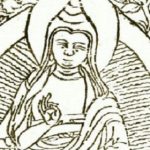by Marjolein Wolf: Catherine Ingram became involved in Buddhism and meditation when she was seventeen years old…
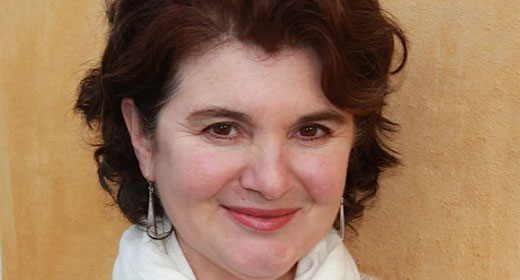
Living in Cambridge, she worked as a journalist for American spiritual magazines such as Yoga Journal and East West Journal, among others; for more than twelve years. Over the course of those years, she interviewed many well-known spiritual leaders and teacher, Krishnamurti, Desmond Tutu, Thich Nhat Hanh, and the Dalai Lama, among them, with a focus on the way they manifested consciousness in the world. Some of these interviews culminated in a book entitled In the Footsteps of Gandhi. At a certain moment she felt that Buddhist practices were not working for her. After a period of what she calls “a dark night of the soul” she met the Indian guru Poonjaji. “With him there was a recognition of something I had always known but had not given its due.” It was the end of her belief in reincarnation, karma and even in enlightenment. She now has informal communities in Portland, Oregon, Los Angeles, San Francisco, Boston, London, and a number of other cities in the U.S. and Europe. This is the second of a series of interviews with female spiritual teachers about their role in a changing society.
A growing number of female spiritual teachers are standing up these days. According to Catherine Ingram this is an expression of a new balance in which feminine principles are becoming more important. As a result, being grounded in the world replaces the old spiritual view of rejecting the world or transcending to the Absolute. Representatives of this new wave don’t go to monasteries, striving to get enlightened. They have families and careers and see God in all manifestation. Or they travel around, giving Satsang. “There is a strong feminine voice that needs to be heard–and our time seems to be the time for that.”
You have been involved with spirituality for many years now. When did your spiritual search start?
My initial motivation for searching was due to suffering. I had a miserable childhood and by the time I was seventeen years old I was searching for some kind of meaning, something that would make sense of the misery in myself and in the world. At that point I discovered Eastern philosophy and began studying on my own, since I grew up in Virginia and there were no teachers around there at the time. At a certain point I read Be Here Now, the classic book by Ram Dass. I was very much impressed with that and shortly afterwards, in 1974, I went to Naropa Institute, founded by Chogyam Trungpa Rinpoche, where Ram Dass and many teachers of various traditions had gathered. It was here that I met my first teacher, Joseph Goldstein, teaching Vipassana Buddhist) meditation. When I first heard the Buddhist teachings I felt very much at home. And that began a training lasting many years in Buddhist meditation, and in particular, vipassana. In 1976, I helped to found a meditation center in Massachusetts, and I started to travel all around the world studying dharma and setting up retreats.
You also had a career as a journalist?
Yes, in my study of dharma there came a point when I thought.’ ‘This is all well and good for us, but how does it help anybody?’ I wanted to be around people who were manifesting their understanding about truth in the world. So I became a journalist solely to talk to those people. I settled down in Cambridge, Massachusetts and I began seeking out what you could call ‘the Gandhis of our time’. I interviewed all the great spiritual teachers I could find and specialized in consciousness and activism. I wanted to figure out how our actions in the world are reflections of our understanding. I did this work for twelve years.
Were you also still involved in Buddhism in that period?
Yes, my Buddhist study went on for almost twenty years. And for a long time I felt very proficient in the practice. But one day I realized that it was joyless. I dontt know if it was my understanding of Buddhism or what, but it was really joyless to me. When I came to that point, all the beliefs I had held for so long also fell away. The beliefs about karma, about reincarnation, even the goal of enlightenment… I realized it was just a belief, an idea that the ‘I’ is going to get something. In this belief we are still waiting for a new car, a new job… a new life–waiting for happiness. At this point I went into a very bleak, dark night of the soul, which lasted for about two years.
How did you overcome this crisis?
One day I went to satsang with a spiritual teacher named Andrew Cohen. It was the first time I heard about the Indian guru Poonjaji. A number of my friends were also going to see Poonjaji at that time. After they came back they told me about him and I could see the transformation in them. Several of them had been long time Buddhist practitioners like myself and had the same difficulties I had. So I went to see Poonjaji. And his teachings of freedom here and now and the realizing of natural awareness were just so… There was a huge readiness in me to plunge. And since then there has been a great love of non-dual teachings wherever I find them. Not only in the classical Advaita Vedanta, but also in Sufism or in Dzogchen or in Christianity. It has been a kind of love-affair with this true seeing, catalyzed by meeting Poonjaji. Between ’91 and ’94 I went three times to see him, each time for about one or two months. It was less than six months all together. But with him it didn’t matter how long you stayed. You could just go there for a week and in this week it was done.
What do you mean by ‘it was done’? You became enlightened?
Enlightenment is not a word I use. I prefer to call this a natural way of being, the most natural actually. Or just radiant presence or dear awareness, clear seeing. I don’t use the word enlightenment because the term itself is very loaded. To many people it implies a kind of Big Bang after which you are eternally in a steady state called enlightenment. While in fact the actual experience is a kind of opening in spaciousness, here and now, which allows anything to come and go, with no resistence. It is not a state, it is just relaxing into a natural ease of being. It’s already here. When people use the word enlightenment, it implies some point in time that you hop into or it happens to you and then you are there for ever more… I don’t think this is a good way of thinking about it.
Then let me put the question this way: with Poonjaji you realized your true nature?
Yes, but what I saw was a recognition of something I already knew. I just hadn’t been paying full attention to it. I hadn’t given it it’s due, it’s importance, until I met Poonjaji. 1 didn’t realize: this is IT. And then I saw it really was ~. And it became more and more IT, over time. Everybody has the potential of knowing and living in this vastness. Everyone has an awakened nature and is consciousness manifesting. It just has to do with what you are paying attention to. Some people are paying more attention to this ease of being. They are allowing their attention to rest essentially in this ease of being. Little bubbles on the screen may come by and sometimes they get a little attention, but that’s about it. While normally people are lost in the bubbles on the screen; they focus on them. That’s the difference. It is a switch of perception.
A switch in perception which usually takes place as a gradual process?
Well, it can happen totally instantaneously too. Some people recognize their true nature right away and that is where their attention rests from that moment on. But for many people it is a process of getting used to it. It is not a process of an occurring; it is a process of a consistency. It is a deepening and a slow relaxation into that recognition. I’ll tell you an experience I once had to illustrate this. A few years ago I had a dream in which my house had burnt down. In the dream I thought: ‘I’ve got to call for help’. But of course the telephone had burned. And then I went through a whole list of things, all kinds of problems being added. I realized that the insurance papers were also burnt. There was a rising panic, until I suddenly woke up from the dream. I thought: ‘Oh fine, the house is here. Now I can go and find the insurance papers…’ Have you ever had anything like this? It takes a moment to realize that the central problem is gone before you realize that all the other problems that were hanging on to it are also gone. The moment you recognize your true nature, it takes a moment to realize that all your problems were hanging on the central erroneous belief that you are somebody. When this belief is gone, all the problems are gone at the same time. To realize this is waking up fully from the dream.
How did the process of realizing your true nature develop for you?
When I first recognized this pure awareness, that nobody ever touches, which nothing ever sticks to, it was very thrilling to me. I thought that I would never again notice anything else. But the little bubbles, neuroses and all kinds of things came up again. They caught my attention for a little while. And then they fell away again and there was this spaciousness, vastness again. So on one hand I could say it has been a gradual process. But on the other hand I would say it has really gone quite quickly and continuously. And it still goes on and on.
How did this process of recognition influence your life?
It changed my life completely. Prior to that I had a lot of depression. Buddhism can be used to justify your unsatisfactoriness. So if you are depressed you might use Buddhism as a justification for seeing things clearly. For me the first and most important change when I shifted my attention from Buddhism to Poonjaji was on that field. I went from a habit of being unhappy – and having this as a spiritual perspective – to a much more happy worldview. I went from a sense of no-Self; which was emphasized in Buddhism, to a sense of all-Self. I went from a feeling of emptiness to an experience of fullness. It was a very joyous discovery. I started to feel intimately connected with everything and in love with everything. It was the end of the belief that this ‘I’ is going to get something more, in fact in this clear seeing you are already in totality. There’s only this totality that you can enjoy now. There’s no need for anything, promises of more in the future – so I didn’t need the beliefs of karma and reincarnation anymore. I saw they were just beliefs, somebody’s ideas, not different from the Christian beliefs of going to heaven. And of course this radically changes all aspects of life.
In that field I used to be a tragic-romantic. I was always chasing romance until I was about forty. But now I feel this intimacy that I used to try to get from romance in a different way. Although it sounds a bit grandiose, I would say I feel this intimacy with everything now. I tend to say I have a relationship with God, but that is too dualistic. It doesn’t feel like me and other. It is no-relationship. Basically this feeling of intimacy with everything is so richly in my life that I don’t have the need or craving for a relationship or sex anymore. I live on my own and I haven’t had sex for years. I’m not saying that I never will again, I have no idea. It is not a decision that I made. If it would happen it will be fine and beautiful. And if it doesn’t that’s okay with me as well.
When did you start to give Satsangs?
It was not through any decision on my part. After twelve years of being a journalist, I was getting tired of the writing and the editing. So I stopped this work and I didn’t know what I was going to do. Then Ram Dass invited me to give Satsang at one of his large retreats. It was in 1992. I had known him for many years by then. We had been on the dharma trail together. Starting to give Satsang was a wonderful expression of the journey. I loved it from the start. It’s wonderful to be able to share this understanding; it is a sharing of love.
Do you think you were asked to give Satsang because you are a woman?
It could be. I think this is the time of women teachers. I can see it everywhere. Especially in the west there are a lot of strong female teachers now. It seems like there is a feminine voice that needs to be heard and this seems to be the time for that. Not to say that there aren’t some wonderful male teachers, but we are moving into a balancing of the feminine principles in the world. Whereby cooperation, care taking and being grounded in this world are important. This is a change. So far there was much emphasis on spirituality being some kind of transcendence to the Absolute, floating up in the sky, rejecting the world in favour of the so-called divine. I think that worldview’s time has passed. It is a worldview which is associated with a predominantly patriarchal ways of seeing things. The whole view is a little bit anachronistic. This is the time to combine the beautiful principles of understanding with a celebration of daily life, an appreciation of the feminine.
So you don’t think – as some spiritual approaches say – that women don’t have a chance to realize their true nature…?
(Laughing loudly) It must have been said by some men! It is just a belief and it is a silly belief. Gandhi actually said that he thought women have a better chance for clear understanding because women are naturally trained to be selfless as mothers. I don’t think recognizing true nature is about gender. It is not reduced to what genitals or chromosomes we have. It is way beyond that.
I would like to believe Gandhi. It sounds like good news.
(Laughing again) Well, I don’t know… Yes, our conditioning as women is often to be more selfless. But of course a man who has been highly conditioned to be very self-centered also has true nature. And maybe that very condition wakes him up to it because being self-centered is unpleasant. And that might actually be how grace works for him.
Is there a difference in the way male and female teachers transmit their knowledge?
Each person shares in a completely unique way. I think the differences are more individual and cannot be generalized. Some women teachers share in a very masculine way. They have wonderful sharp swords. And many men come more into the feminine balance as well. Like the mystic poet Rumi for example. His poetry is an incredible feminine expression of love and celebration of every particle of dust. The general trend is that there is more of a feminine wave. But it needs to include some of the masculine too, like the yin-yang principle.
What is your unique way of teaching?
I don’t have a way to describe it. The best I can say is that I have a strong love of authenticity. I have an allergy to pretension.. I am very sensitive to it, especially in teachers. Some so called teachers I have seen have a lot of guru pretensions. I sense that sometimes there is an ambition, people want to be on a stage and find a way to do that by pretending they are a guru. It has to do with love of power and adoration. All kinds of people fall into this trap – both men and women. It is very immature. One of the things that I so appreciated about my first teacher, Joseph Goldstein was how accessible he was. He had incredible clarity and was an amazing teacher. And yet he was so regular, so accessible. He didn’t put on airs or have what is called in Zen, “the stink of purity.” He was just natural.
You said that the world is developing towards a more balanced situation. How does this come out in our practical circumstances?
What I see happening actually now is that there is a lull spectrum of expressions coming out in the people involved in these teachings. In other words, they are not only in monasteries, striving and straining to get enlightened. And they are also not going to big parties every night, dancing and taking drugs. So it is not one extreme or the other anymore. There is more balance. Many people nowadays find a way to enjoy and celebrate life without indulging themselves in a hedonistic lifestyle. I see them living in the world in a moderate way, having families and careers. And yet they have this love of a spiritual life, seeing God in all manifestation. They have a normal life, while honouring a kind of greater view that permeates everything.
Do you think the number of people interested in spirituality will increase in the future?
I don’t know. So far we are talking about a relatively small number of people who are interested in these matters. Just see how many people watched the World Cup Football and how many people come to Satsang. And when you think about the huge populations on the earth, China, the Middle East, India, Africa… even in our own countries we are talking about very tiny numbers. Who knows how it will develop? The only thing I can say is that realizing your true nature has a powerful effect in your own community. You touch someone with light and the other person touches a few others and they touch a few others… That is enough.
Do you have any ideas about your personal future?
No, none at all. In former days I used to think about my personal life all the time. (Laughing) Which was probably why I was so depressed! But now I don’t really do any future tripping anymore.
Oh, but I was just about to end this interview with some ‘world wide future tripping’? Where is humankind going?
(Smiling) Your questions are quite global. For many years my own interests focused on these global issues, until a more simple, closer to home view became more predominant. To focus on here and now is really enough. You know, I once asked Ram Dass this very question in an interview and he gave a great answer. He said: if humankind is on the way to destroy itself, then the best way to prepare for that is to quiet the mind and open the heart. And if we are facing a new world order, then the best way to prepare for that is to quiet the mind and open the heart! I would say something similar. Really I have no idea where we are headed. In the now you can look around, you can read the newspaper and see that there is a lot of suffering, a lot of madness, a lot of decisions being made that seem to effect things negatively. And at the same time you see a lot of intelligence coming through as well. Who knows how it is going to develop? We may change this earth into a big desert or we may wake up before we actually do that and make some huge and exciting changes. I think that living as a Buddha, living in wakeful consciousness is the best plan, whatever happens. Then you can celebrate in the light and you can be helpful in the darkness.

